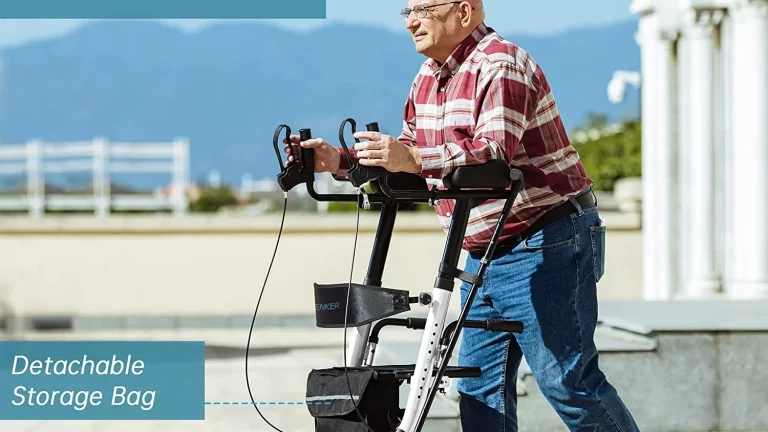A walker is one of the most popular mobility aids for people who need extra support while walking. Whether it’s a basic walker, a rollator walker with seat, or even a stand-up walker for adults, these devices can make life easier and safer.
But here’s the thing—not everyone is a good candidate for using a walker. In some cases, a walker might be unnecessary, uncomfortable, or even unsafe. So, who should NOT use walkers for adults? Let’s break it down.
What Are Walkers for Adults?
Before we get into who shouldn’t use them, let’s quickly go over what walkers for adults actually are.
Walkers come in different types:
✔ Standard Walkers – No wheels, need to be lifted with each step.
✔ Walkers with Wheels – Two or four wheels for easier movement.
✔ Walkers with Seats for Adults – A rolling walker (or rollator) with a built-in seat for resting.
✔ Stand-Up Walkers for Adults – Designed to help users stand more upright, reducing hunching.
One of the most popular brands is the Elenker walker, which offers lightweight, foldable options with various features.
While walkers can help many people, they’re not for everyone.
Who Should NOT Use a Walker?
1. People Who Need Full Non-Weight Bearing Support
Walkers are great for stability, but they are not designed to completely take weight off one leg. If you’ve had surgery or an injury that requires zero weight on one leg, a walker isn’t the right choice.
✅ Better alternative: A knee scooter (like the Elenker walker scooter) or crutches are safer options.
2. Anyone with Severe Upper Body Weakness
To use a walker safely, you need enough arm strength to grip the handles and control your movement. If you have severe weakness in your arms, hands, or shoulders, using a walker could be difficult or even dangerous.
✅ Better alternative: A rollator walker with seat (if light support is needed) or a wheelchair (for full support).
3. Those Who Can Walk Safely Without Assistance
If you have good balance and strength, using a walker when you don’t actually need one can slow you down and even make your muscles weaker over time. Some people use walkers out of habit or just because they have one, but if you can walk without one, it might not be necessary.
✅ Better alternative: A cane or no device at all, depending on your mobility level.
4. People Who Struggle with Coordination or Cognition
A walker requires some level of coordination and awareness. If someone has advanced dementia, Alzheimer’s, or a neurological condition that makes it hard to follow instructions, a walker may not be safe.
They could:
🚫 Forget how to use it properly.
🚫 Try to sit on a walker that doesn’t have a seat.
🚫 Push it too fast and fall.
✅ Better alternative: A wheelchair or caregiver-assisted mobility device.
5. Anyone Who Cannot Control Their Walking Speed
A rollator walker with seat or walkers with wheels move easily, but that can be a problem for people who have trouble controlling their speed. If someone leans too much on the walker or pushes too fast, they might roll forward too quickly and lose balance.
✅ Better alternative: A standard walker without wheels or a gait belt with caregiver assistance.
6. Those Who Have Severe Postural Instability
Some people struggle with severe balance problems, especially those with advanced Parkinson’s disease, vertigo, or post-stroke conditions. If standing upright or maintaining posture is a major challenge, a walker may not provide enough support.
✅ Better alternative: A wheelchair or stand-assist device.
7. People Who Live in a Small or Cluttered Space
This isn’t a medical reason, but it’s still important! If your home has tight spaces, narrow hallways, or lots of furniture, using a walker might be frustrating or even hazardous. Constantly squeezing past obstacles can lead to tripping or getting stuck.
✅ Better alternative: A cane or foldable walker that’s easier to store.
What Are Some Good Alternatives?
If a walker isn’t the right fit, here are some better options:
✔ Canes – For light support when walking.
✔ Knee Scooters – Great for non-weight-bearing leg injuries.
✔ Wheelchairs – A safer choice for those with severe mobility issues.
✔ Gait Belts – For caregivers assisting someone with balance.
✔ Stand Assist Devices – Help with standing but don’t require constant use like a walker.
Should You Use a Walker?
A walker can be a great mobility aid—but only if it’s the right fit for your needs.
🚫 Do NOT use a walker if:
- You can’t bear any weight on your legs.
- Your upper body is too weak to control it.
- You can walk safely without one.
- You struggle with coordination or cognitive issues.
- You live in a tight space that makes walker use difficult.
If you’re unsure whether a walker is right for you, talk to your doctor or physical therapist. The goal is always safe and confident mobility, so choose the right tool for your needs!

